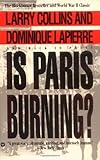Um trecho deste extrato de Delanceyplace:
"His first act [was] to liberate the bar of the Hotel du Grand
Veneur, a honeysuckle-covered inn favored by weekending Parisians and
their ladies. In the bar he had installed a case of hand grenades, a
carbine, a bottle of the grateful owner's best cognac and a prewar
Michelin road map on which he had already begun to plot the German
positions in the neighborhood. To the FFI [French Forces of the
Interior] who had started to drift into the hotel, Hemingway was 'mon
capitaine.' By the time Paris was liberated, in one of the most rapid
promotions in French military history, he would be 'mon general.'
Today's selection -- from Is Paris Burning? by Larry Collins and Dominique Lapierre.
In August of 1944, the Nazis were losing control of Paris, a city they had occupied since 1940. Aware that the U.S. Army was now marching across France, Parisians began occupying government buildings and putting up barricades. Berlin ordered two Panzer tank divisions south to Paris to "restore order in the city at any price." Hope now lay with the Americans, who were just 30 miles from Paris:
"Two Panzer divisions ... were on their way south. [Generalfeldmarschall Walther Model] had only one sharp parting phrase [for Paris' commander General Dietrich von Choltitz]: 'Restore order in the city at any price.'
"The streets of Paris which, a few hours earlier, had rung with the proud words 'Aux Barricades!' now echoed a more anguished cry, rising up from those first flimsy fortifications. It was 'The tanks are coming.' ... The Panzers that had given Adolf Hitler the key to Paris in 1940 swarmed again into the streets of the capital. ...
"That evening brought the first drops of a new rainstorm and, along with it, a wild and welcome rumor. It buoyed up the spirits of the entire population of Paris. ... Playwright André Roussin set it down: 'A day begun in fear ends in hope,' he wrote. 'It seems the Americans are in Rambouillet. Tomorrow they will be in Paris.'
|
|
At the village of Rambouillet, Col. David Bruce (left) OSS commander in the European Theater, Ernest Hemingway (center).
|
"The Americans were indeed in Rambouillet, only 30 miles from Paris. ... Roussin had, however, somewhat overestimated their number. There were three of them, and none of them had any real business being there. The first was a courtly Virginian named David Bruce, a colonel, the head of the OSS for France, whose capture would have afforded untrammeled delight to the Germans. The second was a jeep driver, a taciturn GI named 'Red' Pelkey, from West Virginia. The third was a war correspondent. True to a promise sworn long before, Ernest Hemingway was leading the United States press corps to Paris.
"His first act [was] to liberate the bar of the Hotel du Grand Veneur, a honeysuckle-covered inn favored by weekending Parisians and their ladies. In the bar he had installed a case of hand grenades, a carbine, a bottle of the grateful owner's best cognac and a prewar Michelin road map on which he had already begun to plot the German positions in the neighborhood. To the FFI [French Forces of the Interior] who had started to drift into the hotel, Hemingway was 'mon capitaine.' By the time Paris was liberated, in one of the most rapid promotions in French military history, he would be 'mon general.'
"Sole liberators of this hunting preserve of the kings and presidents of France, and forty-eight hours ahead of the rest of the Allied armies, the trio found themselves saddled with an embarrassing problem: too many Germans. 'Every time we turned around,' Bruce found, 'one was crawling out of the woodwork to surrender.' Hemingway took away their pants and put them to work in the kitchen peeling potatoes for his growing band of FFI."
To subscribe, please click here or text "nonfiction" to 22828.
|






